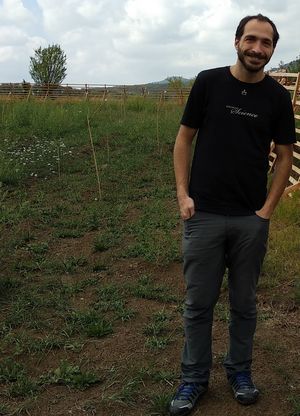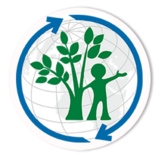- Akos Ivanyi, Ungarn
- Starford Mvula, Zambia
- Behruz Ilnazarov, Tadjikistan
- Lela Kakhniashvili, Georgia
- Carla Ocano, Uruguay
- Alfredo Rodriguez Zunino, Peru
- Rina Kristanti und Yayuk Siswiyanti, Indonesien
- Tibor Kadar, Rumänien
- Noor Hussein, Kenia
- Joaquin Garrido, Uruguay
- Lee Xiong, Laos
- Nehemia Gurusinga, Indonesien
- Edi Kurniadi und Kusdamayanti, Indonesien
- Myroslav Kabal, Ukraine
- Ekatherina Nevmerzhitskaya und Nikolay Nevmerzhitsky, Russland
- Le Xuan Toan, Vietnam
- Li Ming, China
- Ekaterine Balarjishvili, Georgien
- Gamin Gesa und Yopie Parisi, Indonesien
Forest Genetic Resources in Germany

Report by Joaquín María Garrido Soares de Lima from Uruguay
In August 2017 I made the Forest Experts Program in Germany. My area of work in Uruguay is related to the management of forest propagation materials, with emphasis on the use of genetic resources and their conservation. Consequently, the program that was designed for my training in Germany included several centers and institutions working in the Forest. My training mainly took place in the Northwest German Forest Research Institute (NW-FVA), where I was able to meet excellent professionals who showed me all their lines of work and main activities. The other institutions visited were the German Forest Society, the University of Göttingen, the Forest Seed Information Center Oerrel, the German Tree Nursery Association, the Niedersächsische Landesforsten and finally the Department Forest Genetic and Breeding in Dresden.
The training in so many different institutions allowed me to understand the global landscape of forest management in Germany and particularly how it handles forest propagation materials. The main topics that we were discussing during my stay in Germany were vegetative and sexual propagation, minimum standards for maintaining genetic variation, selection of seed stands, establishment and maintenance of seed orchards. Also certification procedure according to OECD, seed collection, handling and storage. Finally legal frameworks of both the European Union and Germany regarding the transit and management of forest seeds.
It was very inspiring to be able to see the solid knowledge bases in which the whole forestry sector in Germany is developed and to understand the mental pictures that the German people have in relation to the forest.
Report
I arrived at Frankfurt airport on August 7 to start training the next day in Göttingen. Mr. Marcus Kühling (CEO of the German Forest Society (Deutscher Forstverein)), and Mrs Sabine Kühling were waiting for me. Firstly we talked about the organization and the formal aspects of the training, then we started with the introduction of Germany, the forest, the forestry sector and we made a visit to a nearby forest. At the University of Göttingen we visited the Department of Genetics and Forest Improvement where we discussed with Dr. Ludger Leinemann the research that the department is carrying out.
The following week I started my stay in Hann. Münden, where most of my program took place (August 13 to 24). The organization that received me was the Northwest German Forest Research Institute (NW-FVA). Mr. Dr. Aki Höltken was the one who welcomed me and introduced me to the institute and to those who would be my references to work on the different tasks. Mr. Höltken is head of the forest genetic analysis department.
My visit to NW-FVA was planned in order to know several work areas and the people in charge. This program allowed me to understand the global nature of the institute and how the different lines of work are related. It was really interesting and positive to have the opportunity to train in such varied subjects with so many professionals. During my training in NW-FVA I visited many departments and we also made field trips to have an overview of all the trails and investigations.
Once I finished my stay at Hann. Münden I traveled to Oerrel to meet Mr. Olaf Schöne and the Seed Information Center. With Mr. Schöne we discussed the criteria for the selection of seed stands and the process of certification of the seed according to OECD. Then we visited the Seed Center and I was able to appreciate in detail the entire process of seed collection, cleaning, drying and storage. This subject is very interesting to me, because in my place of work we carry out all these tasks but on a smaller scale and much more artisanal, with a greater requirement of manpower. In Germany they have very well studied the management of all these processes for each of their forest species.
The next day we made a field trip, where we visited some forest nurseries that produce seedlings for the forest service of Lower Saxony. Quality and quantity of plants that could be taken to the forest were evaluated. Finally, we went through several seed stands and seed orchards, and talked about the criteria that are behind each one.
Once I finished my training at Oerrel, I met Mr. Alain Paul, Managing Director of the German Tree Nursery Association. In conjunction with a delegation that came from Indonesia we visited two large forest nurseries and discussed the production and supply of tree seedlings for all kinds of forest owners, tree nursery techniques, supply chains, tree seed collection, storage and distribution. The nurseries visited had a very important production of seedlings for northern Germany and even export seedlings to Denmark and Sweden.
The next day, also with the Indonesian delegation, we visited Mr. Lutz Kulenkampff, District Leader FMU Sellhorn. There they showed us several indicators and parameters that the forestry sector in Lower Saxony manages, allowing us to understand the complete panorama. Mr. Kulenkampff also presented the long-term ecological forest development (LÖWE-program) and we saw the importance of responsible forest management and the idea of the close-to-nature management.
My last stop was the Forest Seed Testing Center in Dresden, Saxony. There I met Dr. Heino Wolf, with whom we studied all the legal aspects and regulations related to the management of forest propagation material. We discussed the laws and legal frameworks of both the European Union and Germany regarding the transit and management of forest seeds. We were also able to go through the laboratories where the seed tests are carried out, and we carried out counts and analysis of germination, purity and humidity.
The FEP completely exceeded my expectations, giving me an invaluable knowledge and gave me the opportunity to meet great professionals with whom I could establish a network of consultations and work.
In general terms, I think the program for my training in Germany was the best possible, because I have visited so many places and met so many professionals who are working in the forests of Germany. It allowed me to understand in a global way how the sector works and where the new lines of work go in the future. My feedback is highly positive, since not only the personal treatment was excellent, but every institute that received me gave me the necessary knowledge and they were always predisposed to dispel any doubt I had. It was very inspirative to be able to see the solid knowledge bases in which the whole forestry sector in Germany is developed and to understand the mental pictures that the German people have in relation to their forests. Punctually I want to thank Mr. Marcus and Mrs. Sabine Kühling, who were always supporting me and worried to make my entire stay in Germany perfect. Without a doubt they have achieved it, and I take to Uruguay a lot of experiences and practical knowledge that are doubtless very useful in Uruguay.
Joaquín María Garrido Soares de Lima

